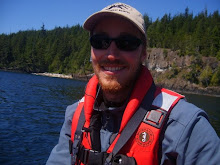 So it's almost the end of November. If you live in the northern half of the northern hemisphere you've probably already sealed your windows, piled a few more blankets on your bed and paid your gas bill in an attempt to keep the icy hand of winter from creeping into your house and freezing you where you sleep. No? Well maybe that's just my house. At any rate, this is occasionally the fate of sea creatures living beneath the ice of the Antarctic, as you can see for yourself in this incredible time-lapse video from the clever folks at the BBC.
So it's almost the end of November. If you live in the northern half of the northern hemisphere you've probably already sealed your windows, piled a few more blankets on your bed and paid your gas bill in an attempt to keep the icy hand of winter from creeping into your house and freezing you where you sleep. No? Well maybe that's just my house. At any rate, this is occasionally the fate of sea creatures living beneath the ice of the Antarctic, as you can see for yourself in this incredible time-lapse video from the clever folks at the BBC.The BBC assures us that this is a production of BBC Nature rather than their special effects department
In contrast to this unusual phenomenon, or rather in conjunction with it, is the ongoing warming of our seas as the result of Climate Change. With only 30 shopping days left until Christmas, warming of the world's oceans may not be at the forefront of your mind. But this gradual change in temperature poses a far greater threat to marine life around the globe than icy destruction you just witnessed above.
A study released last week in Nature Climate Change (co-authored by fisheries economists, biologists, and climate change scientists) shows that our global fisheries, already beleaguered by overfishing, pollution and habitat destruction, are headed for even greater problems as temperatures continue to rise. The study warns that these changes (which are already becoming apparent in warmer areas of the world), could have a serious impact on everything from the number of species in each area to the size of the of the individual fish, all of which will affect the cost of catching these fish and the price at the till (not to mention our ability to feed our growing population). Aside from curbing our carbon emissions, the report suggests immediate action to reduce pressure on global fish stocks as well as adapting our fisheries to prepare for these changes. Perhaps this is another job for marine protected areas. Anyway you can read the full report here.
On a related note, signs of Climate Change's evil twin Ocean Acidification are showing up once again in the northeastern Pacific oyster industry. A recent article in Yale Environment 360 shows that this sinister legacy of the industrial era is already causing tremendous problems for shellfish an forcing those who make a living from them to adapt or sink. And the problem has only continued to worsen and spread over the past half decade since massive die-offs of oyster larvae were first observed at hatcheries in Oregon.
Not to end on a down note, scientists at the Monterey Bay Aquarium Research Institute (MBARI) have created a cool new system for studying the effect of acidification on sea creatures that live on the ocean floor. This system (which looks a bit like a component for the international space station) will allow researchers to study these effects a natural environment, rather than trying to duplicate them in the lab.

That's amazing, but let's hear it for the BBC film crew and for David Attenborough. They could make my morning routine seem fascinating. "The hour is early, and the man's brain has not yet awoken. His locomotion is more of a controlled falling mediated by strategic crashes into familiar objects, rather than conscious ambulation. A bonk on the noggin from a refrigerator tells him: he has reached the kitchen. Watch now, as he drinks his coffee without even removing the toothbrush from his mouth. Fascinating."
ReplyDelete